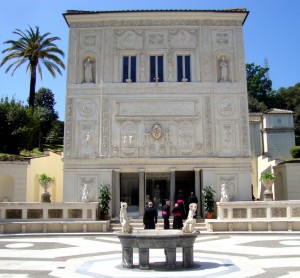Someone told me a few days ago that something like ten percent of Catholics leave the Church because they think there’s a “war” between Catholicism and modern science. I don’t generally put much faith in such statistics because there are many variables. Whom did they ask? How dedicated to the Catholic faith are respondents? Were they pretty much already headed out the door anyway? People oftentimes like to “dress up” their loss of faith with some intellectual justification. The purported enmity between science and Catholicism is as good as any.
But let’s suppose for a moment, just for the sake of argument, that these numbers are roughly accurate. The thing that really bothers me about this news is this: there is no conflict between Catholicism and modern science. Catholicism has never denied the reality of what Thomas Aquinas used to call “secondary causality.” The Church has always affirmed that God can work in and through natural causes.
So, for example, there is no more problem for Catholics over evolution than there is over normal human reproduction. On the one hand, we say that God “intended” your existence from all eternity. And yet, Catholics have never denied that the proximate cause of your existence is father and mother, sperm and egg, meiosis and mitosis, and all the rest.
Besides, no serious historian of science takes seriously anymore the thesis that the relationship between science and Christianity is one of constant, irreconcilable “conflict.” The “conflict” thesis has been replaced by what is sometimes called the “complexity” thesis. Sometimes there was a conflict, but at other times the Church was a key supporter of scientific development, and in other cases the two simply didn’t overlap.
So why are these people leaving?
I mean, let’s say that we found out that people were leaving the Church because they said that they didn’t want to be part of a Church that made use of albino assassins: “What? The Church doesn’t make use of albino assassins. That’s just silly.” We might suspect that the people in question had been reading Dan Brown’s idiotic book, The Da Vinci Code. And we’d probably say to ourselves: “They left the Church over that? They threw over a centuries-old tradition of worship and theological reflection, with all its amazing saints like Francis and Dominic and Mother Teresa of Calcutta, and all the intellectual firepower of fathers and doctors of the Church like Augustine, Thomas Aquinas, Bonaventure, Gregory of Nyssa, Basil the Great, Athanasius, and so many others because a minor con man, trying to make a buck, told them that the Church makes use of albino assassins. Do they believe that there are sacred monkeys in the Vatican? People spread that rumor too.

There are all sorts of reasons why people decide to leave the Church. Catholicism can be hard. It asks a lot. And the rewards are not exactly material: no new cars, large screen televisions, yachts, and the like. There’s an old reply to the saying, “You’ll get your reward in the next life” which goes: “You’d better, because there’s certainly no reward in this one.”
And then, of course, there’s the problem of evil, which is in fact a real problem, not a made up problem, like the “conflict” between science and Catholicism. People experience real suffering, real pain in the world, and they have every reason to ask: Where is the supposedly “all-good God” in the midst of all this?
When C. S. Lewis was an atheist and thought about this problem, he realized that he actually had no basis for complaint – not as an atheist. What had caused him to think that the universe should be “good” at all? Indeed, what right did he have, apart from a belief in some ultimate Goodness, to make any distinction between “good” and “evil”? Quite frankly, it’s only the rumor that there just might be something like an “all-good God” that produces the so-called “problem of pain” in the first place. Without a caring, loving God, anything is possible. And as Dostoyevsky famously said, “Without God . . . everything is permitted.”
Still, evil and suffering, pain and death: these are hard realities to bear. And it’s easy to get angry with God when you expected Him to treat you better. Like all good relationships, the one with God takes work.
But to leave the Church because of some supposed “conflict” between science and Catholicism? That’s like leaving your wife because some dubious character tells you he thinks she’s secretly a Russian spy. If it were true, no one would blame you for leaving. But if you just took someone’s word for it, and left your wife on that basis alone, I think we’d have to say you should have been a little more circumspect, that perhaps your beloved wife deserved a little something better from you: something like a little faith.
And yet, the reality remains: someone is filling young people’s heads with this false story. If you want to see an example of it, I suggest watching a little piece of anti-Catholic bigotry entitled “Galileo: On the Shoulders of Giants,” an “award-winning” after-school special for kids that has almost nothing to do with Galileo, and everything to do with instigating hatred of the Catholic Church. You might also take a look at two patently anti-Catholic tracts: John William Draper’s The History of the Conflict Between Religion and Science and Andrew Dickson White’s A History of the Warfare of Science with Theology in Christendom. These are the geniuses who started the fairy tale about everyone believing the world was flat until Columbus proved it wasn’t.
The truth, of course, was that no one in Europe thought the world was flat (just read Dante). The story is absolutely false. It’s pure propaganda – just like the story about the “war” between science and religion.














